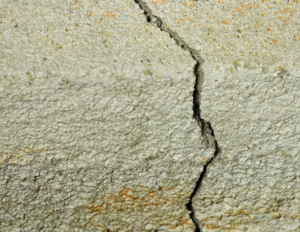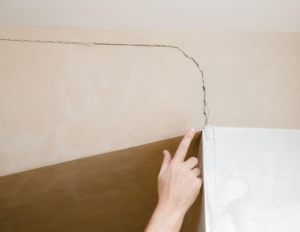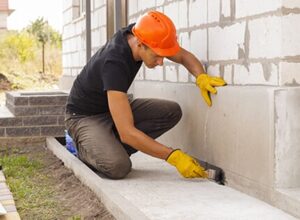×
Charleston, SC is a highly desirable place to live, with beautiful scenery, rich history, and a strong sense of community. However, the climate and soil in and around the city tend to promote foundation problems, which may lead to costly repair bills. Fortunately, if you know what to lookout for, and with the help a reputable home foundation inspection, you can prevent or remedy these problems.
Below, we’ll discuss common foundation problems, along with the likely underlying cause, the most appropriate solution, and the cost of foundation repair in Charleston. We’ll also point out some red flags that can help you identify problems before they become severe.
Cracks appear in nearly every home foundation after construction. Most are the result of ordinary, healthy settling of the concrete. Settling cracks are typically less than ⅛” thick and run vertically on the side of the slab or spread out across the surface. These aren’t cause for alarm in most cases, but many homeowners choose to seal them for cosmetic reasons and to prevent water intrusion.
Wider or uneven gaps in the slab and those crossing over the corners of your foundation are more severe and often indicative of structural damage. They develop because of soil movement. Charleston is underlain by expansive Bohicket soil, which is high in clay content. It swells and shrinks in response to moisture changes, exposing your foundation to uneven support and dangerous shifting.

If you have hairline cracks from normal settlement, you can have them sealed to keep water and moisture from coming through. In Charleston, this typically costs around $250 per crack.
If you have structural cracks that are wider, uneven, or spanning the corners of the slab, you likely need stabilization in the form of underpinning. This process involves placing supports, called push piers, under your slab to provide additional support where the soil is shifting. Push piers usually cost between $1000 and $3000 each, depending on the type you need. You can expect your total cost to fall between $3000 and $20,000.
Water intrusion is a the most common type of foundation damage in Charleston. A few factors contribute to this problem.
First, the city receives an average of 48 inches of rain annually, which is more than 1.5x the national average. Rainfall frequently saturates the soil, leaving home foundations exposed to moisture for extended periods. Runoff wicks through foundation cracks or directly through undamaged, porous concrete and enters your home.
Second, Charleston has very shallow groundwater, as it’s located so close to the coast. The average height above sea level throughout the city is just 19 feet, meaning there is little room for runoff to drain before it backs up to the surface.
This low elevation in combination with above-average rainfall leaves the city prone to flooding. Floodwater interacting with your foundation and the surrounding soil can contribute to shifting, and it promote water and moisture issues in your home.
One of the best and most permanent solutions to water and moisture issues is a waterproofing system. In Charleston, these typically include gutter systems, French drains, crack sealing, and soil gradation. For those rare homes with basements, the system may also include sump pumps, other interior drainage systems, or footing drains.
A waterproofing system in Charleston typically costs between $2000 and $7500, depending on the extent of the moisture issue. Your foundation repair specialist might recommend more extensive measures if your property experiences flooding regularly.
Home foundations are under a lot of pressure from the weight of your house and the expansive soil underneath. As such, it’s imperative to identify minor problems and have them professionally repaired before they become severe. Even a DIY foundation inspection can help unearth foundation problems before they develop into structural instability. Of course, you’ll want to follow up with a professional assessment of any concerns you might find.
Foundation cracks are the most prevalent foundation problem in the Charleston area. Most homes in the area are built slab-on-grade with limited access to the concrete. Still, you can inspect the visible strip of concrete under your home from outside. Look for cracks wider than ⅛” or those that wrap around the corners of your home. It’s best to have a structural engineer inspect these larger gaps. They can advise if the issue is structural in nature and requires stabilization.
Even if you don’t notice cracks, keep an eye out for signs of a shifting foundation inside your home. Typical symptoms include cracks in the sheetrock around windows, doors, and the corners of rooms, sloping floors, and nail heads popping through the sheetrock. You may also notice windows and doors that stick when you open or close them, indicating the framing has shifted in response to foundation movement.
 Since most homes in Charleston don’t have basements, identifying water intrusion can be tricky. Homeowners likely won’t find visible water damage, but instead will notice changes in moisture. Moist air typically feels colder in the winter and hotter in the summer, so uncomfortable indoor temperatures can indicate a water intrusion problem.
Since most homes in Charleston don’t have basements, identifying water intrusion can be tricky. Homeowners likely won’t find visible water damage, but instead will notice changes in moisture. Moist air typically feels colder in the winter and hotter in the summer, so uncomfortable indoor temperatures can indicate a water intrusion problem.
Moisture trapped between your slab and your flooring can also promote mold growth. You might notice musty odors, non-seasonal allergy symptoms, itchy eyes, or difficulty breathing. These all suggest a moisture issue beneath your home.
Any signs of moisture should trigger you to contact a foundation waterproofer or repair specialist. They can help you decide if a waterproofing system will solve the issue or if simply sealing foundation cracks will rectify the problem.

Owning a home in Charleston, SC is a rewarding experience. Do be aware, though, that the local geology and climate can lend themselves to foundation damage. As such, a foundation inspection should be a part of your home-buying process. Afterward, you should regularly monitor your foundation for symptoms of damage, as outlined in this guide. Keeping a vigilant eye out will allow you to implement a professional fix before the issue becomes more severe and more expensive to repair.
Monday to Friday: 9:00 am - 5:00 pm
Copyright © 2026 Disher, Hamrick & Myers, Inc. All Rights Reserved.
Website Design by OBS